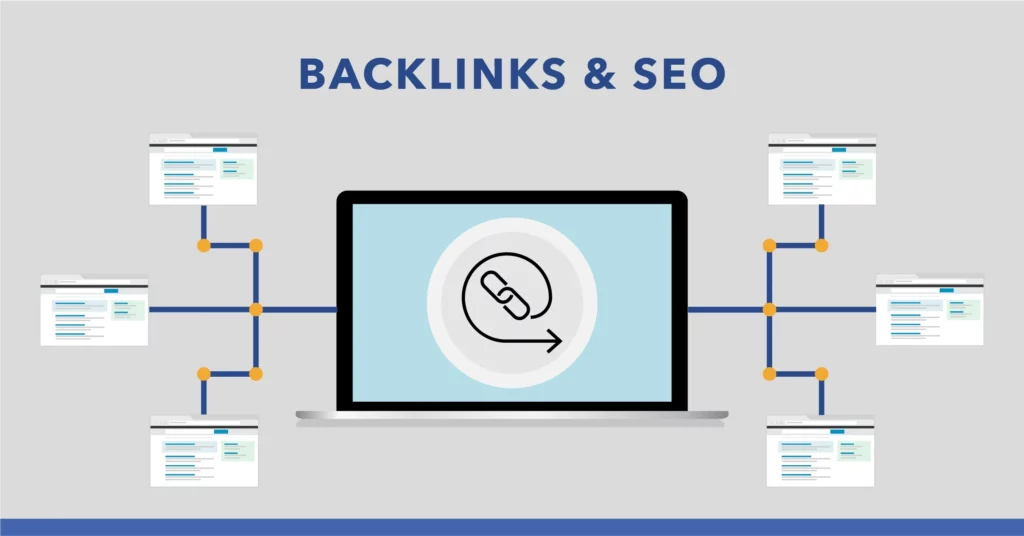Backlinks are one of the most commonly used search engine optimization keywords. Building backlinks with well-known and authoritative websites is vital to Google’s algorithm. They can determine whether a website climbs or falls in Google’s search rankings.
Inbound, incoming, and one-way links are all terms used to describe them.
These links are clickable and allow you to navigate from one website’s page to another’s. Google and other major search engines believe that they significantly impact the quality and quantity of your website. Pages with backlinks are more likely to achieve strong organic search engine results since they provide more material that drives visitors to their web pages and websites.
What Exactly are backlinks?
Backlinks are links from one website to a page on another website (sometimes known as “inbound links,” “incoming links,” or “one-way connections”). Google and other major search engines consider backlinks to be “votes” for a given page. Pages that have a high number of backlinks typically score well in organic search engine results.
What is the importance of backlinks?
They are particularly significant for SEO since they reflect a “vote of trust” from one site to another. In essence, backlinks to your website indicate to search engines that people approve of your material. When many sites link to the same webpage or website, search engines might deduce that the information is worth connecting to and, therefore, worth appearing on a SERP. Earning these backlinks might improve a site’s ranking position or search visibility.
How do backlinks work?
They are vital to search engine algorithms, SEO, and your entire website growth plan. The simplest way to think of backlinks is as conversations between websites.
For example, John is a blogger who publishes a fascinating essay on a sporting event. Samantha, another blogger, shares her thoughts by linking to John’s essay. A hyperlink to John’s piece is created because she writes about the issue on her well-known online magazine site.
Because the online magazine is well-known, many other websites will link to her story. This boosts the authority of the online magazine, and John’s piece receives a useful backlink from a renowned site.
Which types of backlinks should you avoid?
1. Non-newsworthy backlinks in press releases
It is not a good idea to write press releases to obtain backlinks. It may harm your SEO because this method is thought to generate spam. Visitors to websites despise being inundated by such backlinks.
2. Paid Links
The worth of your site is determined by how well other genuine and well-established sites love it. According to Google, buying and selling links can negatively impact a site’s search rankings. You don’t get what you pay for when you purchase links to get an SEO advantage.
3. Directory Links of Low Quality or Irrelevant
Setting up profiles in directories that aren’t reputable or well-regarded (or that aren’t related to your business) may be detrimental to your SEO. They are also considered spam by many website visitors.
4. Low-quality forum backlinks
One brand’s forum postings, especially those with hyperlinks, should be limited to high-quality forums and genuine disputes. People who try to spam these locations with links may not obtain the results they seek.
Types of Backlinks
There are two sorts of backlinks, one more valuable than the other. Let’s look at each one and how it affects your site.
Nofollow Link
A nofollow tag instructs search engines to disregard a link. They transfer no value from one place to another. As a result, they are often ineffective at increasing your search rank or exposure.
Dofollow Link
Dofollow links are the kind of backlinks that everyone desires. Just bear in mind that links from reputable websites are the most valuable. This type of backlink can aid in the improvement of your search engine results.
However, there are certain dofollow links that are regarded as harmful or “poison.” These links are obtained via questionable websites or by violating search engine terms of service.
This may result in Google penalizing or possibly de-indexing your site. Remember that it is the quality of backlinks rather than the quantity that determines the ranking.
How do you get backlinks?
It takes time and works to build backlinks to your website. Here are seven easy techniques to begin creating quality backlinks for your website.
- Link to your website from your social media networks.
- Search Google for an article ranking highly, and then enhance and build on it.
- Make list posts, “how-to” posts, “why” articles, infographics, or video posts. These kinds of postings typically receive more backlinks than conventional posts.
- Create the ultimate guide posts. These are lengthy entries with thousands of words covering every aspect of the subject.
- Contribute to other blogs and websites by writing guest posts.
- Inform influencers in your sector or business about a post on your website that they might wish to link to.
- Interview industry influencers and send them links; they will undoubtedly link to your site.
- You might also start researching competing them. To do so, you’ll need to look at the backlinks of your rivals doing well.
A backlink tool, such as SEMrush, can assist you in locating these links, allowing you to begin targeting those domains as part of your link-building plan.
FAQs
Q. How many backlinks per month are beneficial to SEO?
A rating of 60 to 100 is considered good, 40 to 50 is acceptable, and less than 40 is not exceptional. To build high-quality backlinks, start by obtaining connections from websites with high domain authority. These links must be related to your topic and trusted by search engines worldwide.
Q. What are the most effective types of backlinks?
Do-follow links are the most effective backlinks. Do-follow backlinks pass SEO juice from the website providing the link to the website receiving the link.
